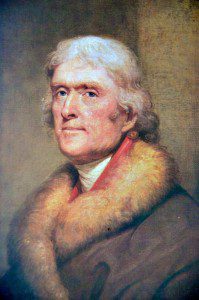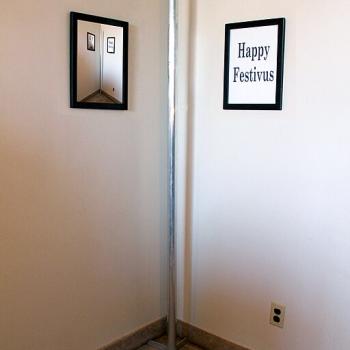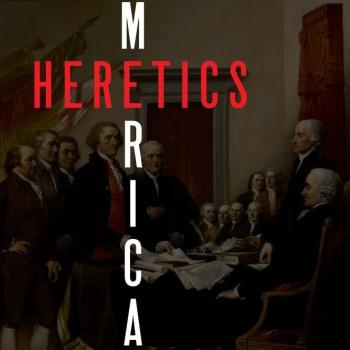 There has been a lot of fuss lately about the beliefs of Thomas Jefferson and his understanding of the relationship between religion and the public life. Most of the fuss has been focused on David Barton’s new book, The Jefferson Lies: Exposing the Myth’s You’ve Always Believed About Thomas Jefferson. I must confess that I have not read Barton’s book (I would like to). But I did see him last week on the Daily Show with Jon Stewart and have read parts of Warren Throckmorton and Michael Coulter’s ebook, Getting Jefferson Right: Fact Checking Claims About Our Third President. These scholars, who both teach at the conservative Christian Grove City College, have responded to Barton’s book in a systematic, point-by-point fashion
There has been a lot of fuss lately about the beliefs of Thomas Jefferson and his understanding of the relationship between religion and the public life. Most of the fuss has been focused on David Barton’s new book, The Jefferson Lies: Exposing the Myth’s You’ve Always Believed About Thomas Jefferson. I must confess that I have not read Barton’s book (I would like to). But I did see him last week on the Daily Show with Jon Stewart and have read parts of Warren Throckmorton and Michael Coulter’s ebook, Getting Jefferson Right: Fact Checking Claims About Our Third President. These scholars, who both teach at the conservative Christian Grove City College, have responded to Barton’s book in a systematic, point-by-point fashion
It is not my intention in this, my first post at The Anxious Bench, to challenge Barton’s claims. Rather, I want to give a brief synopsis, after carefully studying Jefferson’s writings, of what I think he did and did not believe about Christianity and its relationship to public life. Since this is a blog post, I will need to be short and sweet, but if you want to go deeper I would recommend (here comes the shameful plug) reading chapter thirteen of my Was America Founded as a Christian Nation?: A Historical Introduction.
Jefferson was born into a traditional eighteenth-century Anglican family. His father was an Anglican vestryman and young Thomas was schooled by Anglican ministers at the College of William and Mary. He was married in the Anglican Church and baptized his children as Anglicans. He was always fascinated by religion. He read sermons and theological tracts and corresponded on matters related to religion with some of the era’s greatest intellectuals. The late historian Edwin Gaustad has called him “the most self-consciously theological of all American presidents.”
Our third president also had a vibrant religious faith. He was a follower of the teachings of Jesus of Nazareth. He maintained a devotional life that sustained him through times of crisis, including the death of his wife and the loss of five children. His commonplace book is filled with inspirational writings and his library contained volumes to aid him in his religious meditations. His so-called “Jefferson Bible” (which I have discussed here) was intended, as Gaustad has written, “for his assurance, for a more restful sleep at night and a more confident greeting of the mornings.”
Was Thomas Jefferson a Christian? If one’s definition of Christianity is based solely on the moral teachings of Jesus as recorded in the Gospels, then Jefferson was a Christian. But if you measure Jefferson’s beliefs against the history of orthodox Christian teaching, he falls well short.
Jefferson rejected any doctrines that could not be explained by reason, including the incarnation, the deity of Christ, the atonement, and the resurrection. But he did think that it was rational to believe in a God who created the world. He was not an atheist; rather he was convinced that any rational person would come to the conclusion that the universe had an intelligent “designer.” Unlike his deist friends, he did not believe that God had removed himself from creation. Jefferson’s God was active in sustaining the world. He governed the affairs of humankind by his providence. Jefferson called this creator and sustainer of the universe, “Nature’s God.”
Jefferson was convinced that his commitment to the moral teachings of Jesus made him a Christian. In 1816 he wrote, “I am a real Christian, that is to say, a disciple of the doctrines of Jesus. On occasion, Jefferson could sound like an evangelist. He believed that if the moral precepts of the gospel were preached in their purest form, “the whole civilized world would now have been Christian.”
Despite Jefferson’s dislike of the clergy and the organized religion that they advanced, he dogmatically defended their right to practice it. More than any other founder, with perhaps the exception of James Madison, Jefferson championed religious freedom. To defend such an idea in colonial Virginia made him a radical. He joined with evangelical Baptists and Presbyterians to challenge the established Anglican Church and bring the separation of church and state to the Old Dominion.
Jefferson’s views on religious freedom were rooted in his conviction that all human beings had been endowed by God with certain rights—including the right to worship in the way they saw fit without having to support an established church. To deny religious freedom to individuals was a form of tyranny. This is why he believed that government should have no role whatsoever in promoting religion in public life. In his Bill for Establishing Religious Freedom, Jefferson noted how religious and civil rulers had “assumed dominion over the faith of others, setting up their own opinions and modes of thinking as the only true and infallible, and as such endeavoring to impose them on others.” These rulers “hath established and maintained false religions over the greatest part of the world and through all time.”
But just what were these “false religions” that Jefferson wrote about? Jefferson did not name them, but from his other writings on religion we can be rather sure of what he meant by them. First, as we have seen, Jefferson believed that a religion was false if its tenets did not conform to reason. His Bill for Religious Freedom may thus be read as yet another Jeffersonian attack on the kind of Christian institutions, led by power-hungry clergy, that he believed were corrupting the pure teachings of Jesus of Nazareth.
Second, a religion was “false” when it was linked too closely to the state. Jefferson offered several candidates for this kind of “false religion.” Certainly the Anglican Church in both England and Virginia qualified on this front. So did the Congregational religious establishments in New England. In an 1817 letter to John Adams, Jefferson commented on the breakup of the Congregational establishment in the state of Connecticut. He rejoiced at the news that Connecticut had finally retreated from the “Monkish darkness, bigotry, and abhorrence of those advances of mind” that flowed directly from their religious establishment. Jefferson claimed to join Adams in “sincere congratulations that this den of the priesthood is at length broken up, and that a protestant popedom is no longer to disgrace the American history and character.”
Jefferson kept a careful eye out for “false religions” that he believed were trying to promote a Christian nation. “Presbyterians”—a name that Jefferson probably used as a general term to describe any and all Calvinists—drew his particular ire. “The Presbyterian clergy are the loudest, the most intolerant of all sects, the most tyrannical, and ambitious…They pant to reestablish by law that holy inquisition, which they can now only infuse into public opinion.”
In the end, Thomas Jefferson deserved to be considered a great statesman. He also devoted his life to the teachings of Jesus. But he failed virtually every test of Christian orthodoxy. And he was determined to fight against attempts to establish a Christian nation, noting in one of his most famous statements on religious freedom, “I have sworn upon the altar of god eternal hostility against every form of tyranny over the mind of man.”












